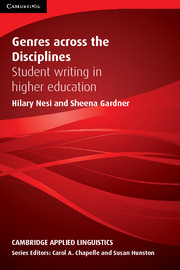Book contents
- Frontmatter
- Contents
- Series editors’ preface
- Abbreviations
- Acknowledgements
- Part I Investigating Student Writing: From Corpus to Genre Family
- 1 Investigating student writing with the BAWE corpus
- 2 Families of genres of assessed writing
- Part II Social Functions of University Student Writing
- 3 Demonstrating knowledge and understanding
- 4 Developing powers of informed and independent reasoning
- 5 Developing research skills
- 6 Preparing for professional practice
- 7 Writing for oneself and others
- 8 Networks across genres and disciplines
- Appendices
- Index
8 - Networks across genres and disciplines
Published online by Cambridge University Press: 07 January 2021
- Frontmatter
- Contents
- Series editors’ preface
- Abbreviations
- Acknowledgements
- Part I Investigating Student Writing: From Corpus to Genre Family
- 1 Investigating student writing with the BAWE corpus
- 2 Families of genres of assessed writing
- Part II Social Functions of University Student Writing
- 3 Demonstrating knowledge and understanding
- 4 Developing powers of informed and independent reasoning
- 5 Developing research skills
- 6 Preparing for professional practice
- 7 Writing for oneself and others
- 8 Networks across genres and disciplines
- Appendices
- Index
Summary
In this book we have described the linguistic features and the social purposes of assignments produced by university students. Our descriptions have identified different genres within 13 genre families, and have indicated the central stages through which these genres unfold across and within specific disciplines. In this final chapter we will consider the methodologies we have used, and review our major findings in relation to the broad social purposes of student writing, to genre families, genre networks and registers. We will then identify some of the ways in which these findings can be applied to the teaching and assessment of academic writing. The chapter concludes with suggestions for further research, both in the UK and internationally, and information about how to access the BAWE corpus and related resources.
Our Location Among Research on Student Writing
The landscape of research on university student writing is broad and diverse. In this section we identify where the contribution of this book is located in relation to other research in this area, which we view as complementary and mutually beneficial.
Our aim has been to develop a classification of university writing, and in this respect our research is similar to research that examines university writing tasks. Studies of university writing tasks are motivated by the desire to improve the relevance of university entrance examinations or programme syllabuses; they draw on questionnaire or interview data using university teachers as informants (Jackson, Meyer and Parkinson, 2006; Rosenfeld, Courtney and Fowles, 2004) and / or they refer to course documentation, such as assessment plans, module descriptors and assignment rubrics (Carter, 2007; Cooper and Bikowski, 2007; Gillett and Hammond, 2009; Hale et al., 1996; Melzer, 2009; Moore and Morton, 2005; Zhu, 2004). They usually result in classifications of task types, together with hypotheses about the writing students might produce in response to these tasks. Our research has also drawn on interview data and course documentation to develop our concepts of the social purposes of genres, but importantly our main focus has been on examining and classifying the writing students produce, rather than the tasks university teachers set.
Our classification has been shaped by the broad social purposes that we have identified: demonstrating knowledge and understanding (Chapter 3), developing evaluation and argumentation (Chapter 4), conducting independent research (Chapter 5), preparing for professional practice (Chapter 6) and writing for oneself and others (Chapter 7).
- Type
- Chapter
- Information
- Genres across the DisciplinesStudent Writing in Higher Education, pp. 254 - 266Publisher: Cambridge University PressPrint publication year: 2012

